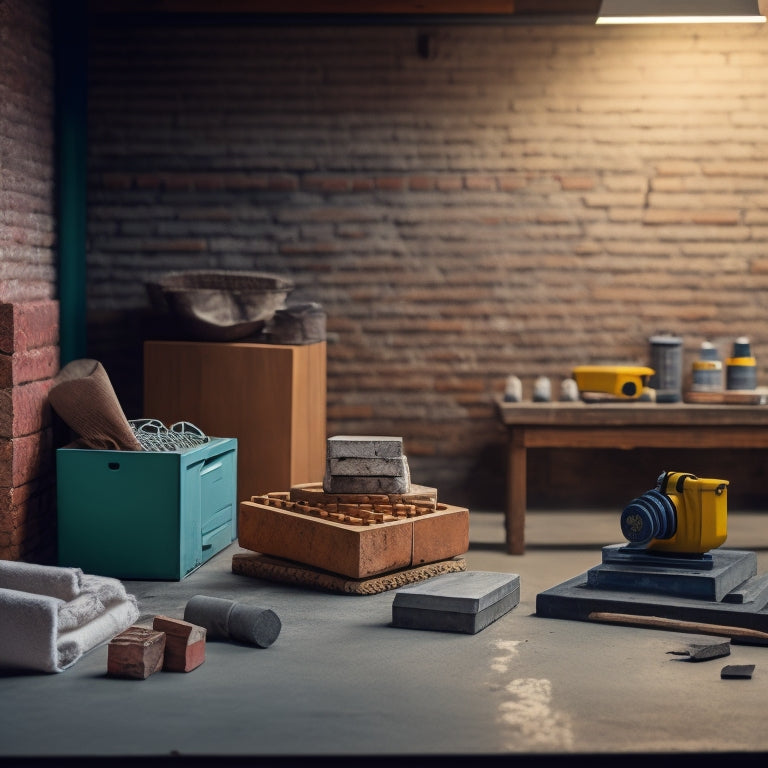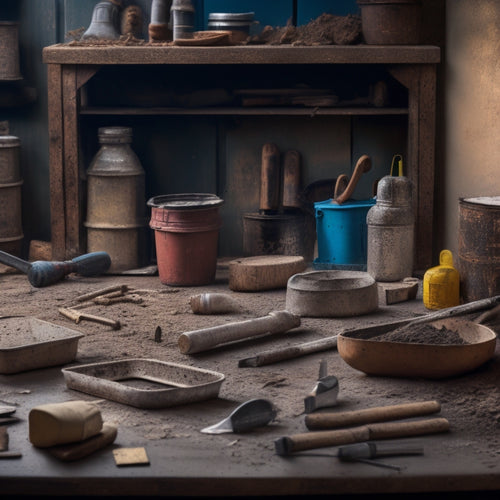
Block Making Machine Reviews for Home Renovators
Share
When selecting a block making machine for your home renovation project, you'll want to evaluate factors like production capacity, safety features, and customization options. DIY concrete block machines prioritize efficiency and safety, while affordable block making options provide cost-effective solutions. Electric block makers cater to specific block size requirements and power consumption needs. Additionally, you'll need to reflect on block size variations, manual and accessory options, and the best block molds for your project. By weighing these factors, you'll find the ideal machine for your project. Now, explore the different types and features to discover the perfect fit for your needs.
Key Takeaways
• Consider DIY concrete block machines for high-quality block production at lower costs with customization options for unique shapes, sizes, and textures.
• Prioritize safety and efficiency during home renovation projects by following manufacturer guidelines and performing regular maintenance, including cleaning, lubrication, and inspections.
• Evaluate affordable block making options, weighing trade-offs between features, production capacity, and safety features to find the best fit for needs and budget.
• Assess the operational efficiency and ease of use of block making machines, prioritizing easy monitoring, consistent block production, and reduced risk of accidents and errors.
• Research and compare different block making machines, considering factors such as power consumption, block size variations, and production tools to ensure the right machine for the project.
Top DIY Concrete Block Machines
Your search for the best DIY concrete block machines ends with these top picks, designed to help you produce high-quality blocks at a lower cost and with greater efficiency.
As a home renovator, you'll appreciate the versatility and customization options offered by these machines. With advanced DIY block designs, you can create unique shapes, sizes, and textures to suit your project's specific needs.
To guarantee peak performance and extend the lifespan of your machine, regular block machine maintenance is vital. This includes routine cleaning, lubrication, and inspections to prevent wear and tear. By following the manufacturer's guidelines and performing regular maintenance tasks, you can minimize downtime and maximize productivity.
With these top-rated DIY concrete block machines, you'll be able to produce high-quality blocks with ease, while also prioritizing safety and efficiency. By investing in one of these reliable machines, you'll be well on your way to completing your home renovation project with confidence and precision.
Affordable Block Making Options
When you're on a tight budget, you'll want to explore affordable block making options that won't break the bank.
You'll find budget block makers that offer cost-effective solutions, and entry-level machines that can help you get started without sacrificing quality.
Budget Block Makers
What sets budget block makers apart from their high-end counterparts is the compromise on features and production capacity to keep costs low. As a home renovator, you'll find that these machines are designed to cater to your DIY block projects, offering a more affordable entry point into block making.
Portable block makers are a great example of budget-friendly options, allowing you to create blocks on-site or in your backyard. These machines are often smaller and lighter, making them easy to transport and store.
When opting for a budget block maker, you'll need to evaluate the trade-offs. You might sacrifice some features, such as automated mixing or advanced vibration systems, to keep costs down. However, these machines still provide a reliable way to produce blocks for your renovation projects.
Be sure to research and compare different models to find the one that best suits your needs and budget. Always prioritize safety when operating any block making machine, following the manufacturer's guidelines and taking necessary precautions to avoid accidents.
Cost-Effective Solutions
As you weigh your block making machine options, you'll find that cost-effective solutions can be achieved by opting for semi-automatic or manual machines that still deliver quality blocks without the hefty price tag.
These machines may require more labor and time, but they can notably reduce your upfront costs. Additionally, they often provide more control over the block-making process, allowing you to fine-tune your production to meet specific requirements.
When it comes to cost-effective solutions, material sourcing is essential. Look for machines that can accommodate locally sourced materials, reducing transportation costs and supporting local sustainability practices.
Furthermore, consider machines that can utilize recycled materials, minimizing waste and promoting eco-friendliness. By doing so, you'll not only reduce your expenses but also contribute to a more environmentally responsible construction process.
Entry-Level Options
You'll find entry-level block making machines that cater to small-scale operations or startups, offering an affordable gateway into the world of block production. These machines are designed with beginner-friendly features that make it easy to get started. They typically come with a compact design, making them perfect for small workshops or home renovations.
When choosing an entry-level block making machine, consider the production capacity, material handling, and safety features. Look for machines with automatic or semi-automatic operation to minimize manual labor and reduce the risk of accidents. Additionally, consider the type of blocks you want to produce, as some machines may be more suited for specific block types.
As a beginner, it's crucial to follow beginner tips to guarantee safe and efficient operation. Always read the user manual, follow safety guidelines, and perform regular maintenance to prevent breakdowns. Start with small production batches to get familiar with the machine's operation and gradually increase production as you gain confidence.
With the right entry-level block making machine and proper operation, you'll be producing high-quality blocks in no time.
Electric Block Makers for Home
When selecting an electric block maker for your home, you'll want to take into account a few key factors.
You'll need to think about the varying block sizes you'll require, as well as the power consumption of the machine to guarantee it fits within your energy budget.
Additionally, you'll want to evaluate how easy the machine is to operate, as this will impact your overall block-making experience.
Block Size Variations Matter
Your block making endeavors will greatly benefit from understanding that electric block makers for home use typically accommodate a range of block sizes, from compact 4-inch to larger 10-inch blocks, allowing you to tailor your creations to specific projects or applications. This flexibility in block dimensions provides you with design flexibility, enabling you to tackle various tasks with precision.
| Block Size | Typical Applications |
|---|---|
| 4-inch | Small decorative projects, gardening borders |
| 6-inch | Medium-sized planters, outdoor seating |
| 10-inch | Large planters, retaining walls, construction |
When choosing an electric block maker, consider the types of projects you plan to work on and the block sizes you'll need. Having a machine that can accommodate various block sizes will give you the versatility to take on different tasks without being limited by the machine's capabilities. This will not only save you time and money but also guarantee that you can complete your projects safely and efficiently. By understanding the block size variations your machine can handle, you'll be able to create a wide range of designs and applications, from small decorative projects to large-scale construction endeavors.
Power Consumption Considerations
The power consumption of an electric block maker for home use is a crucial consideration, as it directly impacts your electricity bill and the machine's overall performance. You need to choose a machine that's energy efficient to minimize your operational costs.
Look for block makers with low power consumption rates, typically measured in watts (W) or kilowatts (kW). A lower power rating doesn't necessarily mean the machine is less effective; it might simply be more energy-efficient.
When evaluating power consumption, consider the machine's motor type, voltage, and frequency. For instance, a block maker with a high-efficiency motor and a lower voltage requirement will likely consume less power.
Additionally, check if the machine has any power-saving features, such as automatic shut-off or sleep mode, to reduce energy waste when not in use.
Ease of Operation
Operating an electric block maker for home use should be a straightforward process that doesn't require extensive technical expertise or physical exertion. You want a machine that's easy to use, so you can focus on getting the job done efficiently.
Look for electric block makers with user-friendly features, such as intuitive control panels, clear instructions, and minimal setup requirements. A well-designed machine should allow you to start producing blocks quickly, without needing to consult the manual repeatedly.
When evaluating an electric block maker's ease of operation, consider its operational efficiency. Can you easily monitor the machine's performance and adjust settings as needed? Are the blocks produced consistently, with minimal waste?
A machine that's easy to operate won't only save you time and effort but also reduce the risk of accidents and errors. By prioritizing ease of operation, you can guarantee a safe and productive block-making experience.
Manual Concrete Block Presses
You'll find manual concrete block presses suitable for small-scale production, as they offer a cost-effective alternative to automated machines. These machines are ideal for home renovators who want to produce a limited number of blocks for their projects.
Manual operation requires you to exert physical effort to compress the concrete mixture into the mold, which can be time-consuming and labor-intensive. However, this process allows for a higher level of control over the block's quality and texture.
When selecting a manual concrete block press, it's crucial to conduct a durability assessment to verify the machine can withstand repeated use. Look for presses made from heavy-duty materials, such as steel or iron, and check the quality of the hydraulic system.
A reliable manual concrete block press should be able to produce blocks with consistent density and texture. Additionally, consider the safety features of the machine, such as safety guards and emergency stops, to prevent accidents and injuries.
Best Block Molds for DIYers
Best Block Molds for DIYers
Selecting the right block mold is essential to producing high-quality concrete blocks, as it directly affects the block's shape, size, and texture. As a DIYer, you'll want to choose a mold that suits your specific needs and preferences. Here are some factors to evaluate:
| Mold Material | Durability | Ease of Use |
|---|---|---|
| Steel | High | Medium |
| Polypropylene | Medium | High |
| Silicone | Low | High |
When selecting a mold material, assess the durability and ease of use. Steel molds are durable but may require more effort to release the blocks. Polypropylene molds offer a good balance between durability and ease of use. Silicone molds are flexible and easy to use but may not be as durable.
When it comes to DIY techniques, you'll want to verify your mold is compatible with your mixing and pouring methods. Evaluate the size and shape of the mold, as well as any special features, such as non-stick coatings or release agents. By choosing the right block mold, you'll be able to produce high-quality concrete blocks that meet your specific needs.
Interlocking Block Making Machines
Interlocking block making machines streamline the production process, enabling you to manufacture high-quality blocks with precise joints and textures, ideal for a wide range of construction projects. These machines allow for faster production and reduced labor costs, making them an attractive option for home renovators.
One of the key benefits of interlocking block making machines is the versatility of their designs. You can create blocks with unique textures and patterns, adding an aesthetic appeal to your construction projects.
Here are some of the key advantages of using interlocking block making machines:
-
Improved structural integrity: Interlocking blocks provide a stronger and more stable structure due to their precise joints and textured surfaces.
-
Enhanced durability: The blocks are less prone to cracking and damage, reducing maintenance costs and ensuring a longer lifespan.
-
Increased safety: The interlocking design reduces the risk of accidents and injuries, providing a safer working environment.
- Cost-effective: Interlocking block making machines can help you reduce labor costs and material waste, making them a cost-effective solution for your construction projects.
Small Scale Block Production Tools
For small-scale block production, investing in the right tools can greatly impact the efficiency and quality of your output. You'll want to focus on equipment that's designed for small-scale block production, as it will help you achieve the desired results without breaking the bank.
Some essential tools for small-scale block production include a concrete mixer, a block mold, and a vibrating table. These tools will help you master various block production techniques, such as compacting and curing.
| Tool | Function | Importance |
|---|---|---|
| Concrete Mixer | Mixes cement, sand, and water | Guarantees consistent mixture |
| Block Mold | Shapes concrete into blocks | Determines block size and shape |
| Vibrating Table | Compacts and settles concrete | Improves block density and strength |
| Tamping Tool | Removes air pockets and excess water | Enhances block quality |
Concrete Block Machine Accessories
As you set up your small-scale block production operation, you'll also need to evaluate the concrete block machine accessories that can enhance the performance of your equipment and streamline your workflow.
These accessories are essential for ensuring the longevity of your machine and optimizing its output.
Here are some key accessories to assess:
-
Mold lubrication systems: These systems reduce wear and tear on your molds, making block machine maintenance easier and more efficient.
-
Vibration control devices: These devices help to minimize vibrations during the block-making process, ensuring a smoother operation and reducing the risk of accidents.
-
Block ejection systems: These systems simplify the block ejection process, reducing manual labor and the risk of injury.
- Dust suppression systems: These systems minimize dust emission during operation, creating a safer working environment and reducing the risk of respiratory problems.
Frequently Asked Questions
Can I Make Curved Blocks With a DIY Concrete Block Machine?
When it comes to creating curved blocks, you'll need to think beyond traditional DIY block techniques.
While it's possible to achieve curved block designs, it requires a high degree of precision and flexibility in your machine.
You'll need to modify your machine's mold or use specialized curved molds to achieve the desired shape.
Additionally, you'll need to guarantee the concrete mixture is flexible enough to maintain its shape and structural integrity.
How Do I Ensure Uniform Block Density and Strength?
To guarantee uniform block density and strength, you'll need to focus on the block mixture and curing techniques.
You'll want to mix your concrete to the ideal consistency, avoiding over- or under-mixing, which can lead to inconsistent density.
Next, implement controlled curing techniques, such as moist curing or steam curing, to promote uniform strength development.
Are Concrete Blocks Suitable for Load-Bearing Walls?
When building load-bearing walls, you need to take into account the block type and its load-bearing capacity. Not all concrete blocks are suitable for load-bearing walls, and it's essential to choose the right one.
Solid concrete blocks with a minimum compressive strength of 1,500 psi are typically recommended for load-bearing applications. Hollow blocks, on the other hand, are better suited for non-load bearing walls or partitions.
Always check the block's specifications and local building codes to guarantee you're making a safe choice.
Can I Use a Manual Block Press for Large-Scale Production?
You might be surprised to know that over 60% of construction projects worldwide still rely on manual labor for block production.
When considering manual block production for large-scale projects, you'll need to weigh efficiency considerations carefully.
Manual block presses can be effective for small-scale production, but they're often slow and labor-intensive, making them less suitable for large-scale projects.
You'll need to assess whether the trade-off between cost and productivity is worth it for your specific project needs.
Do Block Making Machines Require Special Maintenance or Repair?
When operating a block making machine, you'll need to prioritize regular maintenance to prevent breakdowns and guarantee peak performance.
You'll want to follow maintenance tips like lubricating moving parts, cleaning the machine regularly, and performing routine inspections.
Additionally, familiarize yourself with basic repair techniques, such as replacing worn-out components and troubleshooting common issues.
Conclusion
You've weighed the pros and cons, compared features, and considered your budget. Now, you're ready to take the leap and invest in a block making machine for your home renovation project.
On one hand, you'll be saving time and money by producing your own blocks.
On the other hand, you'll be trading in your sweat and effort for a machine that can churn out uniform blocks with ease.
The question is, which one will you choose?
Related Posts
-

Top Tools for DIY Home Renovation Plastering Success
To achieve DIY home renovation plastering success, you'll need a range of essential tools. Start with hand tools like...
-

What to Inspect When Buying Used Renovation Tools
When buying used renovation tools, you need to scrutinize every detail to avoid costly mistakes. Inspect for rust and...
-

Trowel Tool Cost for DIY Home Renovation Projects
When it comes to your DIY home renovation project, you'll need to budget for a variety of trowel tools, including stu...


